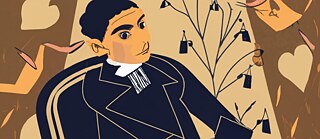Sexuality In Bed with Kafka

Franz Kafka’s complicated relationship with his sexuality has been a topic of constant speculation and analysis. We have reviewed his letters and experts’ opinions to try to clarify things.
“Yesterday, out of pure loneliness, I went to a hotel with a prostitute. She was too old to be melancholic. She was only sorry that men were not as affectionate with prostitutes as they were with their lovers. And I did not console her because she did not console me either.”This is an excerpt from one of the letters that Franz Kafka wrote to his friend and, later, editor of his work, Max Brod. In it he recounts something that we know was common in his life: visiting brothels and being a client of prostitutes. However, from then onwards, the Prague writer’s relationship with sex and his sexuality have always elicited comments and theories. Over past decades there has been speculation about whether he may have been homosexual—a thesis afforded less consideration today—, whether he may have had some kind of philia or phobia, or else a strange or even neurotic relationship to women. But: Do we know anything for certain?
Reiner Stach, author of the enormous three-volume biography of Kafka, maintains that the writer drastically differentiated the women for whom he had real feelings from those about whom he felt indifferently, and that for the former he had a certain respect that made him separate them entirely from anything sexual.
An Ambivalent Relationship with Women
“It is typical for neurotic men to divide women into two groups: those who are sexually appealing and those who are worthy of affection. In short: the mother and the prostitute,” writes the biographer in his third volume. For others, Kafka also had a fear of commitment. Felice Bauer was his greatest love, and they maintained their long-distance relationship through letters. In one of those letters dated 1913, he confesses: “My true fear—and there is nothing worse—is that I will never be able to possess you.” However, shortly after that he asked her to marry him, although that would never materialize.For some, part of this wary attitude is reflected in Georg’s character in The Judgement, who ruminates endlessly in the story over getting married. All this would support Stach’s view, which nonetheless also raises criticism. Especially for those who accuse him of drawing conclusions about the feelings of the author of Metamorphosis in a rather categorical way.
Elisa Martínez Salazar, Professor of German Philology at the University of Zaragoza and expert on Kafka the literary figure and his importance in Spain, plays down these analyses of his sexual life. “If on occasion it has generated interest, I believe it is because of the quantity of autobiographical material (diaries and letters) that has been kept and Kafka’s own capacity for self-analysis. All of this has been quite juicy for those taking psychoanalytic approaches. It is also certainly due to the contrast between an aspect as physical and intimate as sexuality and the idealized image people had of Kafka, mainly because that is how his friend Max Brod wanted to present him,” she points out.
Martínez Salazar also shares her point of view on Felice and Kafka’s epistolary relationship, which was at times very ambiguous and full of contradictions: “Looking at it today, the question arises as to how Felice Bauer was able to endure the psychological tug-of-war that Kafka subjected her to for so long through his letters. He behaved like the dog in the manger: he neither ate nor let anyone eat. He constantly demanded letters from Felice, but at the same time presented himself as a good catch incapable of committing to anything other than writing. This contradiction reflects an internal struggle that is not entirely subconscious, since Kafka made a list of the pros and cons of getting married.”
Kafka Transcends, But Was a Man of His Time
Now, although Kafka may have had his dilemmas: Is it justifiable that he visited prostitutes so frequently? Sigrid Cervera is a sexologist at the Erotic Museum of Barcelona. She tells us that although sexuality became the subject of more analysis at the beginning of the 20th century, we’re looking at a time that was also marked by moral and religious repression, where the dangers of sexual relations such as diseases and other things were emphasized, and where purity was promulgated in opposition to obscenity. Although, on the other hand, at the time going to brothels was common among many men, including those who were young and attractive.”Kafka Was Also Kafka in Bed
Jordi Isidro Molina, adult and couples psychologist at Cedipte-Psicología, has also analyzed Kafka’s writings and finds similarities between his work and his view on affective and sexual relationships. Kafka was in many ways an impossibility: a dichotomy and (again) a constant contradiction. “He lived his life oscillating between desire and guilt, on the one hand enjoying carnal pleasure, but then it seems he would feel regret and possibly guilt. His novels reflect an obsessive person in search of perfection. Particularly, The Castle and The Trial reflect his obsessions as both a need for control and his desire for freedom.” Again, two opposing outlooks, like his relationship with women.Kafka’s writings are for many so transcendental because they are the eternal example of the duality of human beings, living in a perpetual internal conflict between longing and remorse. Perhaps Kafka also felt like Gregor Samsa sexually that morning after a restless dream: like someone who did not recognize nor was able to convey to others how he felt or what he really needed.


